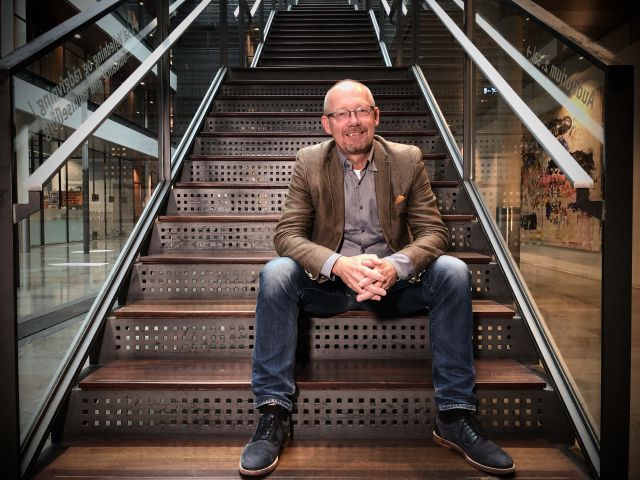CBS researcher puts digital entrepreneurship and expats on the agenda for local elections

(Photo by Anna Holte)
Professor Jan Damsgaard is the initiator behind two after-work meetings where local politicians from Frederiksberg and Copenhagen are invited to discuss digital entrepreneurship and expats’ involvement in society. “Sharing opinions is important for the democratic discourse,” he says.
On Sunday October 24, local politicians running for office in Denmark’s 98 municipalities were given the green light to put up campaign posters. Until November 16, the politicians will be busy convincing you to put your cross by their name, as well as discussing various topics such as climate-proofing measures, elderly care and school policy.
However, two topics must move higher up the agenda, according to Jan Damsgaard, Professor at the Department of Digitalization at CBS.
“We need to focus more on digital entrepreneurship and expats and their families,” he says.
He is therefore hosting two after-work meetings on October 28 and November 9 where candidates from different parties can attend to answer questions and discuss the two topics.
“I have many international colleagues, and I know that they and their families are happy to be in Denmark. They are not just here to earn money, but to build themselves a life with their partners and children. But it can be hard to navigate in Danish society, and many of them don’t know who to vote for in local elections,” explains Jan Damsgaard and continues:
“So this meeting is a chance for them to get to know about the local elections, meet the politicians and hear what the politicians can do for them. And then it’s a step away from the persistent discourse about foreigners only being immigrants and refugees. No, expats deliver value and are part of the economic upswing we are experiencing right now.”
As a member of the previous government’s Disruption Council, Jan Damsgaard is keen on getting digitalization high up on the political agenda. And especially digital entrepreneurship.
According to him, the world is facing a paradigm shift from the industrial to the digital society.
“We cannot put our faith in existing beacons of industry, we must have new digital companies to get us through this challenge. And for that to happen, we need an environment where new businesses can grow, and that has a lot to do with municipalities and their policies,” he says.
More digital businesses are needed
The meeting about digital entrepreneurship is the first of the two after-work meetings and is intended mainly for students interested and engaged in IT digitalization and entrepreneurship. Because, as Jan Damsgaard points out, in 5 or 10 years’ time, those students will be the CEOs of the digital companies needed to drive the digital transformation.
“I’m a member of the Danish Chamber of Commerce’s Tiger Council, which looks at how Denmark can emerge from corona’s shadow and get ahead in the coming decades. One thing we discuss is that it must be as easy to start a business as it is to have a job. Many more businesses must be started up and must grow big,” he says.
Jan Damsgaard explains that if you look at the top 10 biggest digital businesses, none of them are European, and that needs to change.
“You can say that in the EU, we are too good at regulating. It’s not the football referee that wins the match – it’s the teams that acutally play. We often complain that the solutions from the U.S. are too capitalistic, while the ones from China monitor too much. We cannot adopt a wait and see attitude and not do anything ourselves,” he says and continues:
“We must change our approach and create digital businesses based on European morals and ethics. And for that to happen, we need a framework in place to nurture more people to start businesses and go all the way.”
Be part of the democratic discourse
Not only does Jan Damsgaard hope that staff, students and people with a general interest in either of the two topics will show up, he also hopes they will share their opinions and ask questions.
For the meeting about digital entrepreneurship, he has also invited people from the start-up environment to ask the politicians questions, but he hopes that students, with or without start-up experience, will also share their views and experiences.
“I want to nurture and engage the students in a political debate. Social media have created a distance between us, and I believe it’s good to get out, stand up and air your opinion and listen to others too. It’s not just an exchange of views and opinions, but a debate where someone can challenge you too. That’s an extremely important part of democratic discourse,” he says.
And for the expats who show up, he hopes to demonstrate that the distance between the public and the politicians is very short.
“I want to show my non-Danish colleagues that they can make a difference if they want to. Maybe they think the politicians are inaccessible, but you can just talk to them and figure out what they can do for you. And based on that, you can vote on the candidate you think fits the bill best,” he says.





































































































































Comments